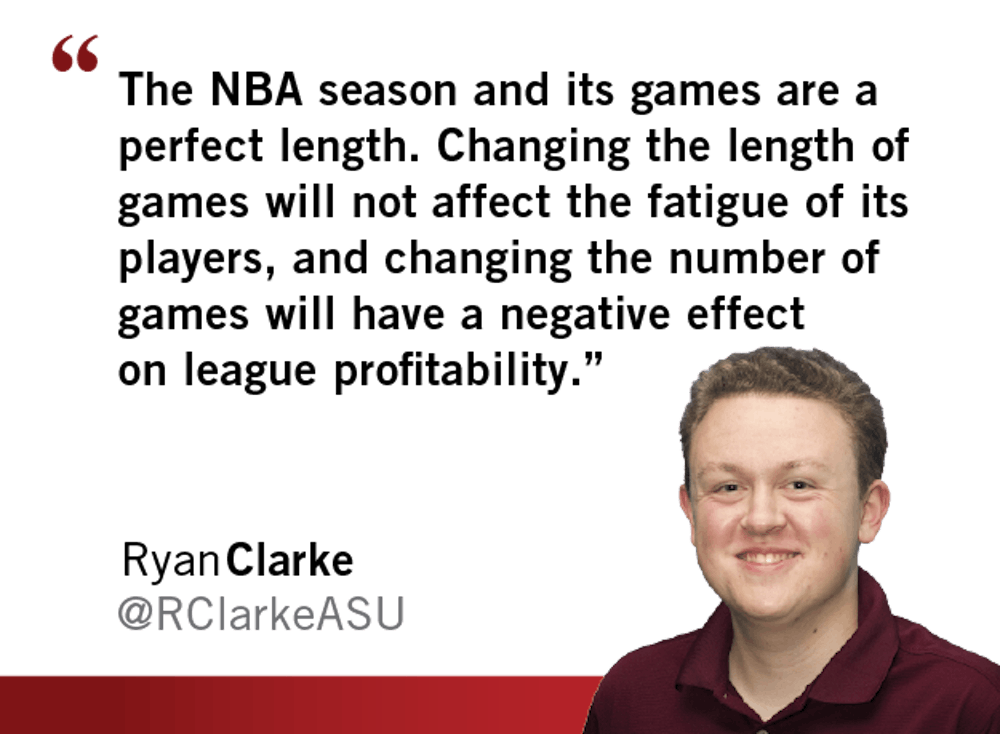 Lebron James can by going any number of places depending on which "source" you listen to. (Photo Courtesy of Paul Tople/Akron Beacon Journal/MCT)
Lebron James can by going any number of places depending on which "source" you listen to. (Photo Courtesy of Paul Tople/Akron Beacon Journal/MCT)
For the past week, the NBA world has been abuzz with talks of shortening games from 48 minutes in length to 44, or even 40. This comes on the heels of the league experimenting with the 44-minute length in a preseason matchup between the Boston Celtics and Brooklyn Nets.
Both current and former players have weighed in on the debate. LeBron James, the undisputed face of the modern NBA, thinks reducing the minutes "doesn't mean anything" and that the league should focus on reducing the number of games played in a season, which stands at 82.
Dirk Nowitzki of the Dallas Mavericks, a superstar and future hall-of-fame talent in his own right, agrees wholeheartedly with James. Nowitzki told ESPN's Tim MacMahon "you don't need 82 games to determine the best eight in each conference" and that he doesn't think fewer minutes would make a difference.
However, the greatest to ever play the game decided to chime in as well, and he doesn't agree with James and Nowitzki. Former Chicago Bulls guard and current Charlotte Hornets owner Michael Jordan believes the number of games is just fine, as are the minutes.
Jordan added that basketball is "not like football" in that football players endure more wear and tear on their bodies over their careers. Therefore, football players have a right to request a shorter season — basketball players don't. There just isn't a concussion-level problem in the NBA, or an issue of mistreatment by the league post-retirement, like there is in the NFL.
I'm going to have to make like Bugs Bunny and the Toon Squad and trust MJ on this one.
The NBA season and its games are a perfect length. Changing the length of games will not affect the fatigue of its players, and changing the number of games will have a negative effect on league profitability.
Everyone from LeBron to Jordan agrees that the shortened games concept makes no difference, including those who participated in the shortened game.
The only impact this change makes is reducing the number of minutes for bench players — one can imagine that coaches wouldn't shave minutes off of their stars' shifts. If you're worried about profits, a reduction in the number of bench players or a drop in their salaries doesn't rake in enough cash to counteract a likely demand from fans for cheaper tickets. Shortening the season damages the league's revenue as well, which is all the more reason why it will never happen. Nowitzki even acknowledged that a change is unlikely, citing the very same reason.
Adam Silver, in his short time as NBA commissioner, has been phenomenal in carrying on the great, revenue-generating legacy of David Stern. The NBA is the third most profitable sports league in the world, ahead of the English Premier League in soccer and behind the NFL and MLB. The league is ever-expanding and open to new ideas — Silver even has a goal in mind of someday rivaling soccer as the most popular sport in the world.
It's doubtful that the NBA would be willing to give up even a small chunk of its enormous revenue to reduce the number of games, especially considering Silver already extended the All-Star break to give players more rest. There just isn't enough backing for the argument other than the complaints of a few superstars.
If big-time players are so concerned with the condition of their bodies and fatigue, they should encourage their coaching staffs to reduce their minutes in the rotation. If coaches have a problem with that, they can look at Gregg Popovich and the San Antonio Spurs. In addition to being the best coach in the NBA, Popovich is also the most intelligent. He knows how to preserve superstars by limiting minutes, resting them on back-to-backs and acquiring a surplus of high-quality bench players that know the system like the back of their hands.
When it comes to Popovich's Spurs teams, the results speak for themselves: 17 consecutive playoff appearances, a .686 win percentage and five NBA titles, including one last year with a roster as advanced in age as it was in skill. If every team with a superstar or two adopted the Popovich way, there'd be no need for a reduction in games or minutes, and barely any stars would complain.
All in all, it's safe to say that the NBA season is fine just the way it is. It's not a matter of too many minutes or too many games — strategic substitution and minute management are the recipe for team success and longevity for star players.
Reach the columnist at RClarke6@asu.edu or follow him on Twitter @RClarkeASU
Editor’s note: The opinions presented in this column are the author’s and do not imply any endorsement from The State Press or its editors.
Want to join the conversation? Send an email to opiniondesk.statepress@gmail.com. Keep letters under 300 words and be sure to include your university affiliation. Anonymity will not be granted.
Like The State Press on Facebook and follow @statepress on Twitter.





